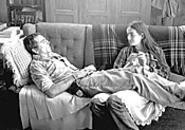The title characters in The Ballad of Jack and Rose are an unreconstructed hippie remnant from the 1960s and his dreamy-eyed teenage daughter, who live in self-imposed exile on an island off the mid-Atlantic coast. The year is 1986 -- but not at their house. While Jack (played with furious intensity by Daniel Day-Lewis) rants about how "humanity is descending the ladder of evolution" and visits the mainland only long enough to blast a tacky new housing development with his shotgun, the motherless girl (portrayed by a lovely sylph named Camilla Belle) remains in thrall to her father's retro-idealist whims. She's been home-schooled for years, which is to say, steeped in radical environmentalism and Jack's brand of post-hallucinogenic Zen, deprived of television, and raised as a sort of hothouse flower. Cooped up in their ramshackle compound -- it was once a commune, with Jack as guru -- she's a prisoner of love and of ideology. "When you die," the girl pledges, "I'm going to die."
And there things might remain, but for Jack's own Lomanesque blindness. Before long, a serious heart ailment is bound to kill him, but instead of, say, giving up smoking, this lefty fundamentalist opts for nostalgia. In the old spirit of social experiment, Jack invites the woman he's been secretly seeing in town, Kathleen (Catherine Keener), and her two unruly sons, Thaddeus and Rodney (Paul Dano, Ryan McDonald), to bunk down on the island. There. Communal life reborn. Family of Man values instantly reconstituted. That Jack neglects to consult the sheltered, vulnerable Rose before making his move is the measure of his blunt certainty.
You don't have to be Shakespeare -- or Arthur Miller -- to figure out what happens next. Frightened and disoriented, the girl fiercely resists the intruders and turns on Dad. But before long, adolescent curiosity kicks in, and Rose starts to evolve under the influence of the newcomers. Thanks to a new haircut, her new sexuality, and a new view of the world, Rose awakens at a crossroads -- just as the three disparate heroines did in Miller's impressive 2002 film Personal Velocity.
This, of course, means trouble for a father whose rule has always gone unchallenged. Does Jack's love of self-determination extend to his daughter's choices? Or is he really a hypocritical dictator who's no better than the crass merchants, developers, and bureaucrats he so reviles? That's the movie's big question, and it certainly has more to do with the social and political legacy of the '60s than with the drama of a creative young woman grappling with her famous father's legend.
"I should never have let the world in," the doomed absolutist laments. Jack never meant his daughter to define herself. But Rebecca Miller is not quite done with Jack, or with Rose. As the title of the film suggests, a potential for tragedy looms over the piece.
Some may find Ballad a bit tedious and dense in spots, but it's beautifully written and dramatically shot by cinematographer Ellen Kuras, and the performances are uniformly superb. Some might question casting the British Day-Lewis as the obstinate Jack, but he is Rebecca Miller's husband, after all, and he is one of the world's finest film actors. The two boys -- McDonald and Dano -- are perfect as Rose's dueling eye-openers, the first pudgy and sensitive, the second sneering and horny. Keener is the picture of rudderless inertia, and old hand Beau Bridges has a nice turn as a square real-estate mogul. But the real revelation here is young Camilla Belle, who invests Rose with just the right mixture of confusion, yearning, and emergent womanhood.
If the overriding ideal of the '60s counterculture was Freedom with a big F, the nagging fact that tagged along was that even Freedom demands Form. In the end, that's what this fascinating, highly literate film is all about. Arthur Miller should be proud.










